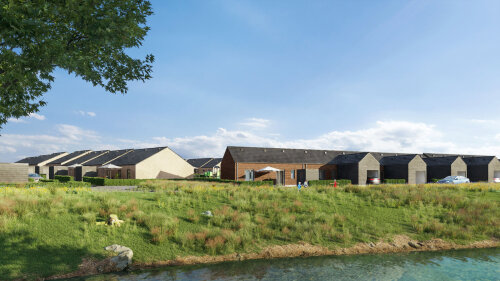Best Land Use & Zoning Lawyers in Denmark
Share your needs with us, get contacted by law firms.
Free. Takes 2 min.
Free Guide to Hiring a Real Estate Lawyer
Or refine your search by selecting a city:
List of the best lawyers in Denmark
About Land Use & Zoning Law in Denmark
Land Use & Zoning Law in Denmark is primarily concerned with regulating the development and use of land within the country. These laws determine how different parcels of land can be used, developed, or preserved, ensuring sustainable urban and rural planning. The Danish Planning Act is the cornerstone legislation in this area, providing guidelines for municipality-led spatial planning and involving public participation to shape development strategies. Denmark prioritizes sustainable development, environmental protection, and cohesive community development in its land use policies.
Why You May Need a Lawyer
There are numerous situations where legal guidance in Land Use & Zoning might be necessary. If you are planning to buy or sell property, a lawyer can help you navigate zoning laws and any restrictions attached to the property. If you're a developer seeking to propose new construction or modify existing structures, understanding permit requirements and compliance with zoning regulations is crucial. Additionally, disputes between neighbors about land use, or challenges to municipal decisions on planning and zoning can also require legal expertise to ensure fair resolution. Protecting land interests, whether for agricultural, residential, or commercial purposes, often necessitates legal advice to understand restrictions and rights.
Local Laws Overview
The Danish Planning Act forms the legal framework for land use planning in Denmark. It mandates comprehensive local plans drafted by municipalities, ensuring that all regional development aligns with national and regional objectives. Key aspects include a focus on sustainable urban growth, integration of environmental standards, protection of natural resources, and community involvement in decision-making. Danish laws emphasize transparency and public participation in the zoning process, providing citizens with opportunities to offer input on proposed changes and developments. Detailed zoning maps, guidelines for environmental assessments, and regulations for agricultural land preservation are vital components of local planning laws.
Frequently Asked Questions
What is the Danish Planning Act?
The Planning Act is Denmark's main legislative framework directing land use, aiming to promote sustainable urban and rural development through strategic land-use planning and public participation.
How is land zoned in Denmark?
Land in Denmark is categorized into separate zones, such as residential, commercial, industrial, agricultural, and special zones. Each category has specific regulations and guidelines for permitted land use.
Can I change the zoning designation of my property?
Changing the zoning designation of a property typically requires a formal request to the local municipal council, involving a public consultation process and compliance with the regional planning strategy.
What permits are required for new construction?
Building permits are essential for new construction or significant modifications to existing buildings. These permits ensure that the proposed development complies with zoning regulations and environmental standards.
How do public consultations work in the zoning process?
Public consultations in Denmark allow citizens to review and provide feedback on proposed zoning plans and amendments, fostering community involvement in the decision-making process.
What are the consequences of violating zoning laws?
Violations of zoning laws can result in fines, legal action, and mandates to halt or reverse unauthorized construction or land use changes.
Can agricultural land be used for residential purposes?
Converting agricultural land to residential use typically involves stringent scrutiny and must align with regional planning policies, following an official application process and public consultation.
How are environmental considerations integrated into zoning?
Environmental considerations are integral to the planning process in Denmark, with mandatory environmental impact assessments required for significant developments, ensuring protection of natural resources.
Who can participate in zoning decisions?
All stakeholders, including residents, property owners, and local community groups, can participate in zoning decisions through public hearings and consultations facilitated by the municipal councils.
What role do municipalities play in zoning?
Danish municipalities are primarily responsible for drafting and implementing local zoning plans in alignment with national and regional strategies, responding to local needs and public input.
Additional Resources
For further assistance, consider consulting the Danish Planning Portal, which provides comprehensive information on land use regulations. Additionally, the Ministry of the Environment of Denmark offers resources and guidance on sustainable development and environmental assessments. The Danish Building Authority can also be a resourceful point for permits and building regulations.
Next Steps
If you require legal assistance in Land Use & Zoning, consider reaching out to a lawyer specialized in Danish property law. Begin by gathering all relevant documents related to your land or property and clearly outline your objectives or issues. Consulting legal directories and seeking recommendations can help you identify experienced professionals. Additionally, attending municipal council meetings can offer insights into local regulations and potential legal considerations.
Lawzana helps you find the best lawyers and law firms in Denmark through a curated and pre-screened list of qualified legal professionals. Our platform offers rankings and detailed profiles of attorneys and law firms, allowing you to compare based on practice areas, including Land Use & Zoning, experience, and client feedback.
Each profile includes a description of the firm's areas of practice, client reviews, team members and partners, year of establishment, spoken languages, office locations, contact information, social media presence, and any published articles or resources. Most firms on our platform speak English and are experienced in both local and international legal matters.
Get a quote from top-rated law firms in Denmark — quickly, securely, and without unnecessary hassle.
Disclaimer:
The information provided on this page is for general informational purposes only and does not constitute legal advice. While we strive to ensure the accuracy and relevance of the content, legal information may change over time, and interpretations of the law can vary. You should always consult with a qualified legal professional for advice specific to your situation.
We disclaim all liability for actions taken or not taken based on the content of this page. If you believe any information is incorrect or outdated, please contact us, and we will review and update it where appropriate.
Browse land use & zoning law firms by city in Denmark
Refine your search by selecting a city.

















